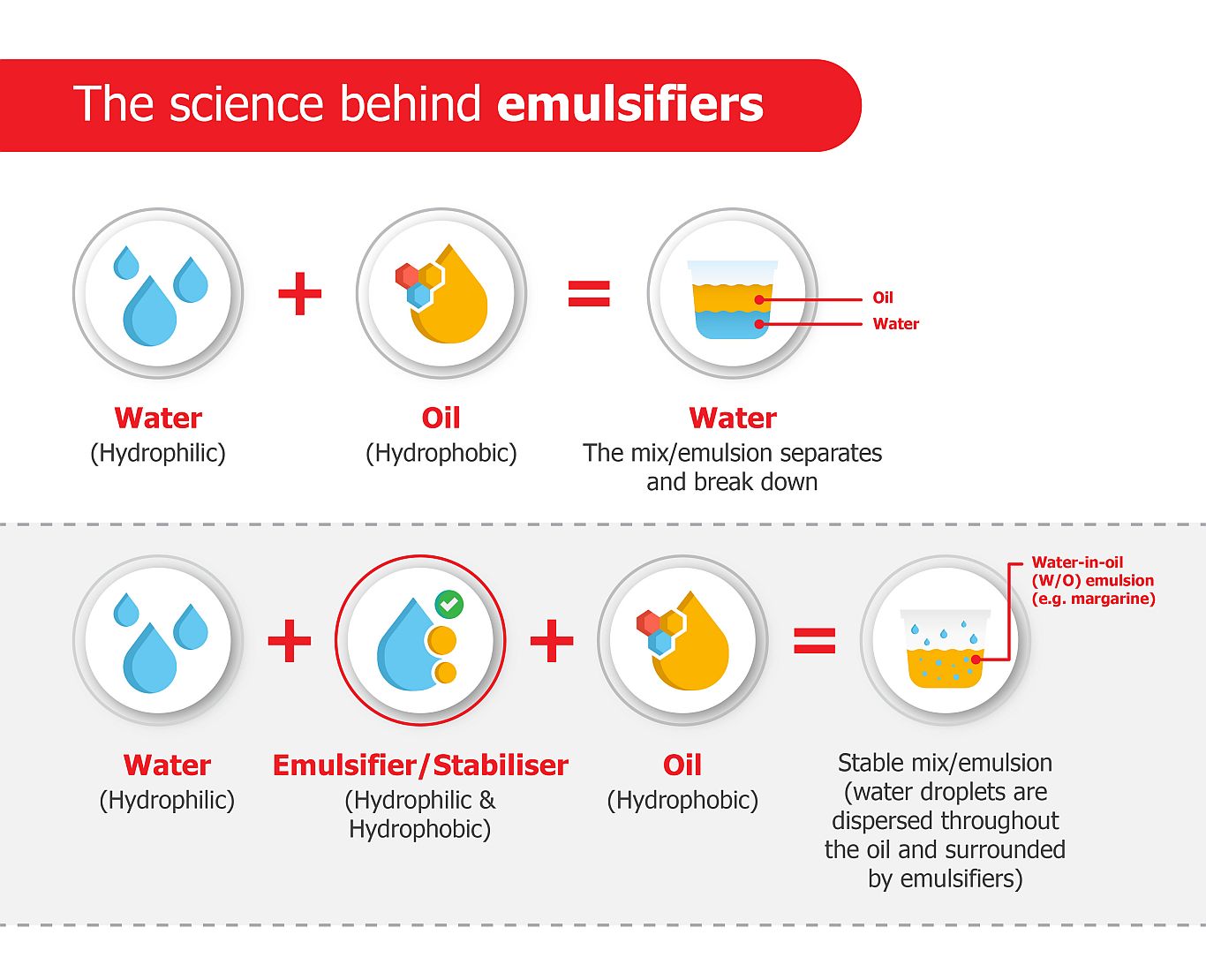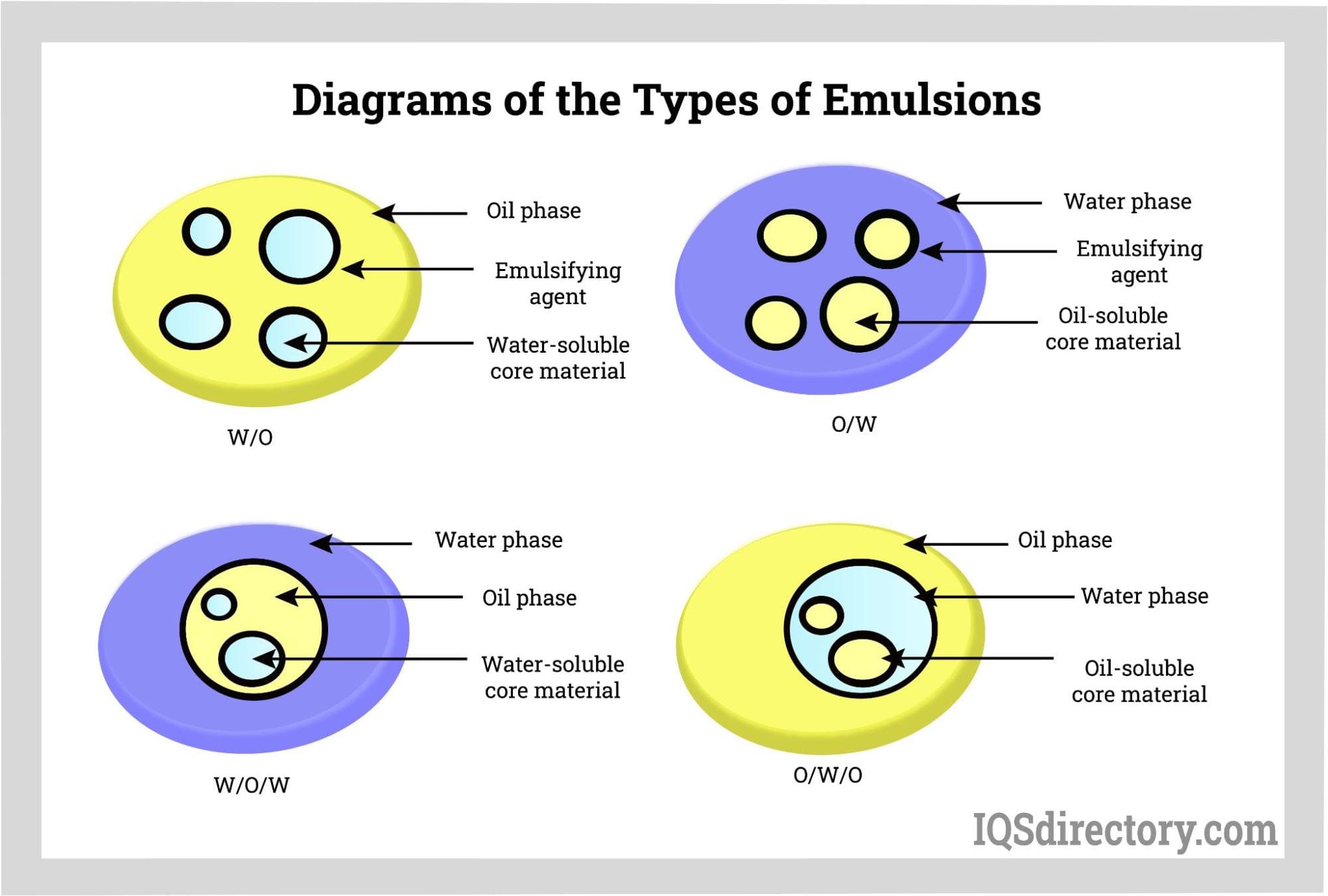Exploring Various Sorts Of Emulsifiers and Their Applications Throughout Industries
Emulsifiers play an essential function in various markets, ensuring products maintain their preferred texture and stability. You may be amazed to uncover the differences between natural and artificial emulsifiers, each bringing distinct benefits to the table. Whether it's in your favorite salad dressing or a skin care product, these compounds are all over. Comprehending their applications can reveal much concerning item quality and performance, but that's simply the beginning of the story.
What Are Emulsifiers?
Emulsifiers are necessary materials that aid blend two immiscible liquids, like oil and water, developing a secure mix. You often run into emulsifiers in day-to-day items, from salad dressings to lotions.
In food production, emulsifiers boost the mouthfeel and security of products, making them more enjoyable. You might not recognize it, but they additionally play a significant duty in boosting life span, avoiding separation, and maintaining look. In cosmetics, emulsifiers help develop lavish structures, permitting also application and absorption. In general, understanding emulsifiers can aid you appreciate the scientific research behind the items you use daily, showcasing their value in various markets.
Sorts of Emulsifiers: Natural vs. Artificial
When thinking about emulsifiers, it is very important to acknowledge the difference in between natural and synthetic options. Natural emulsifiers, stemmed from plant or animal sources, often attract those looking for much healthier, much more eco-friendly products. Instances consist of lecithin from soybeans and beeswax, which can supply security in food and aesthetic formulas.

Choosing in between all-natural and artificial emulsifiers boils down to your specific demands. Ultimately, comprehending your demands will certainly help you select the best emulsifier for your job.

Mechanisms of Activity: Exactly How Emulsifiers Work
Comprehending the distinctions between natural and artificial emulsifiers sets the phase for discovering just how these materials function. Emulsifiers work by minimizing the surface tension in between 2 immiscible fluids, like oil and water. They possess a hydrophilic (water-attracting) head and a hydrophobic (water-repelling) tail, enabling them to connect with both stages. When you mix oil and water, emulsifiers place themselves at the user interface, maintaining the mix.
As you stir, the emulsifiers create an obstacle around oil droplets, stopping them from coalescing. By recognizing these devices, you can much better appreciate the vital function emulsifiers play in various applications, from cosmetics to pharmaceuticals, guaranteeing the preferred texture and stability in items you make use of every day.
Emulsifiers in the Food Sector
In the food market, around 80% of processed foods have emulsifiers, highlighting their important duty in improving structure and stability. These ingredients aid mix oil and water, creating smooth, uniform products like salad dressings, sauces, and gelato. When you choose up a container of mayonnaise or a bottle of delicious chocolate syrup, you're experiencing the magic of emulsifiers at work.
Usual emulsifiers like lecithin, mono- and diglycerides, and polysorbates aren't simply about preference-- they enhance rack life and avoid ingredient separation. This suggests your site preferred foods stay fresher and keep their appealing look.
You'll additionally discover emulsifiers in baked items, where they add to moisture retention and crumb structure. By recognizing the impact of emulsifiers, you can value exactly how they elevate your food experiences, making each bite not just delicious however also regular. Following time you enjoy a velvety dip or an abundant dessert, remember the hidden heroes at job!
Emulsifiers in Cosmetics and Personal Care Products
While you may assume of emulsifiers mainly in food, they play a crucial role in cosmetics and individual care products. These compounds assist mix water and oil, creating smooth, steady solutions in lotions, lotions, and products. You'll find emulsifiers in creams, where they guarantee also circulation of hydrating ingredients, making them a lot more effective on your skin.
When you apply makeup, emulsifiers assist accomplish the right structure, enabling items to glide on easily. They additionally boost the service life of products by protecting against splitting up, assuring you obtain the most out of your preferred items.
Usual emulsifiers in this industry include glyceryl stearate and cetyl alcohol, which not only support solutions yet also offer skin benefits. So, next time you grab a moisturizer or foundation, bear in mind that emulsifiers are quietly functioning behind the scenes to maintain your products effective and delightful to make use of.
Emulsifiers in Pharmaceuticals
Emulsifiers play a necessary duty in drugs by ensuring that energetic components are uniformly distributed within fluid formulas. When you're creating dental, topical, or injectable medicines, you need emulsifiers to stabilize mixes of oil and water, enhancing the bioavailability of the energetic substances. This security is crucial for preserving the effectiveness and safety of the item throughout its shelf life.
You may experience several kinds of emulsifiers, like all-natural ones stemmed from plant sources or synthetic alternatives particularly designed for targeted applications. Each type can affect the texture, absorption price, and overall performance of the drug.
On top of that, emulsifiers can boost the solubility of improperly water-soluble drugs, making them extra healing. As a result, you can produce solutions that are less complicated to provide and more efficient for patients - Emulsifiers. Understanding the duty of emulsifiers will assist you make informed selections in pharmaceutical growth
Emulsifiers in Industrial Applications and Paints
When you think about commercial applications and paints, emulsifiers end up being essential for accomplishing the wanted uniformity learn the facts here now and efficiency of products. They assist support combinations of water and oils, stopping separation and making certain uniformity. In paint formulations, emulsifiers boost dispersion, enabling pigments to mix flawlessly and providing a smooth coating.
You'll discover that different types of emulsifiers cater to particular requirements, such as enhancing attachment, reducing surface tension, or enhancing longevity. In coverings, they assist manage viscosity, making application much easier and extra reliable.
Beyond paints, emulsifiers play a significant role in adhesives and sealants, contributing to much better bonding and versatility. Emulsifiers. By selecting the ideal emulsifier, you can substantially boost item high quality and efficiency, making your offerings a lot more affordable out there. To summarize, emulsifiers are necessary for maximizing commercial applications, making sure that products meet the demands of customers and sector requirements alike
Often Asked Concerns
Are Emulsifiers Safe for Consumption in Food Products?
Yes, emulsifiers in food products are usually secure for intake. They're checked for security and accepted by governing companies. You can delight in foods including emulsifiers without stressing, as they boost structure and stability in your dishes.
Can Emulsifiers Reason Allergies in Some Individuals?
Yes, emulsifiers can create allergies in some people. If you're sensitive to certain active ingredients, it's critical to check out labels meticulously and consult a healthcare specialist if you experience any damaging reactions. Stay educated and safe!
Just How Do Emulsifiers Influence the Service Life of Products?
Emulsifiers improve the service life of products by maintaining blends, stopping separation. They aid keep appearance and flavor, guaranteeing your products continue to be enticing and fresh for longer, inevitably minimizing waste and enhancing your overall experience.
Exist Vegan-Friendly Emulsifiers Available?
Yes, there are lots of vegan-friendly emulsifiers readily available. You'll find options like soy lecithin, sunflower lecithin, and guar gum, view website which work well in numerous recipes while keeping your recipes plant-based and delicious.

What Are the Environmental Influences of Artificial Emulsifiers?
Synthetic emulsifiers can hurt ecosystems via contamination and bioaccumulation. They might disrupt aquatic life and contribute to dirt destruction. You should think about natural alternatives to reduce these environmental effects while maintaining product effectiveness.